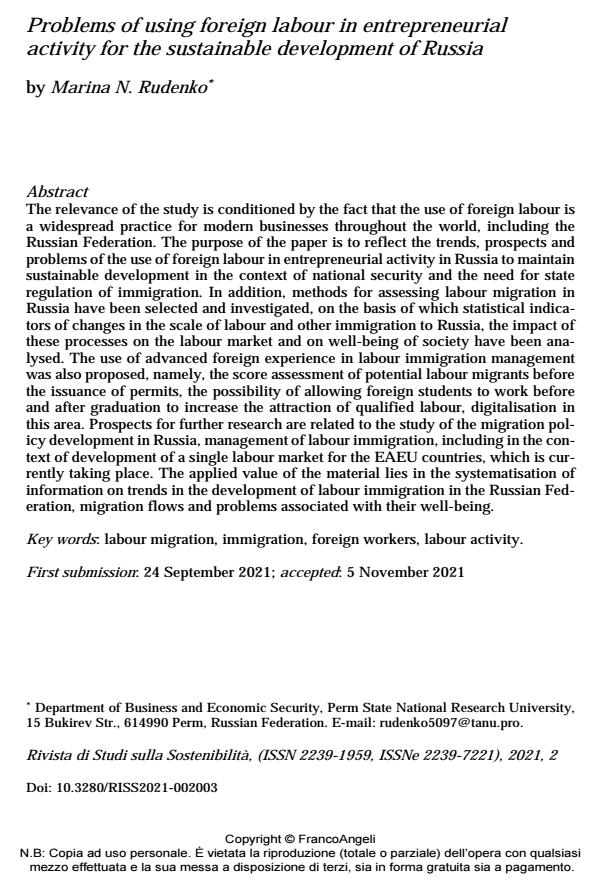Problems of using foreign labour in entrepreneurial activity for the sustainable development of Russia
Titolo Rivista RIVISTA DI STUDI SULLA SOSTENIBILITA'
Autori/Curatori Marina N. Rudenko
Anno di pubblicazione 2022 Fascicolo 2021/2 Lingua Inglese
Numero pagine 17 P. 15-31 Dimensione file 171 KB
DOI 10.3280/RISS2021-002003
Il DOI è il codice a barre della proprietà intellettuale: per saperne di più
clicca qui
Qui sotto puoi vedere in anteprima la prima pagina di questo articolo.
Se questo articolo ti interessa, lo puoi acquistare (e scaricare in formato pdf) seguendo le facili indicazioni per acquistare il download credit. Acquista Download Credits per scaricare questo Articolo in formato PDF

FrancoAngeli è membro della Publishers International Linking Association, Inc (PILA)associazione indipendente e non profit per facilitare (attraverso i servizi tecnologici implementati da CrossRef.org) l’accesso degli studiosi ai contenuti digitali nelle pubblicazioni professionali e scientifiche
The relevance of the study is conditioned by the fact that the use of foreign labour is a widespread practice for modern businesses throughout the world, including the Russian Federation. The purpose of the paper is to reflect the trends, prospects and problems of the use of foreign labour in entrepreneurial activity in Russia to maintain sustainable development in the context of national security and the need for state regulation of immigration. In addition, methods for assessing labour mi-gration in Russia have been selected and investigated, on the basis of which statis-tical indicators of changes in the scale of labour and other immigration to Russia, the impact of these processes on the labour market and on well-being of society have been analysed. The use of advanced foreign experience in labour immigra-tion management was also proposed, namely, the score assessment of potential labour migrants before the issuance of permits, the possibility of allowing foreign students to work before and after graduation to increase the attraction of qualified labour, digitalisation in this area. Prospects for further research are related to the study of the migration policy development in Russia, management of labour im-migration, including in the context of development of a single labour market for the EAEU countries, which is currently taking place. The applied value of the ma-terial lies in the systematisation of information on trends in the development of labour immigration in the Russian Federation, migration flows and problems asso-ciated with their well-being.
Keywords:labour migration, immigration, foreign workers, labour activity.
- Akimzhanov T., Suleymenova S., Altynbekkyzy A., Zinkevich T., Edressov S. and Dosanova M. (2018). Ensuring the principle of zero tolerance to antisocial manifestations: The important condition of the constitutional state creation. Opcion, 34(85): 500-521.
- Bai N.G. (2014). Labour Migration in the States of the Customs Union and the EU. Moscow, Russian Federation: RUDN.
- Barnard H., Deeds D. and Mudambi R. (2019). Migrants, migration policies, and international business research: Current trends and new directions. Journal of International Business Policy, 2: 275-288.
- Belozerova O.A., Aleksandrov I.F., Deltsova N.V., Kot M.K. and Startseva S.V. (2018). International legal regulation of labour in the Russian federation. Journal of Advanced Research in Law and Economics, 9: 905-911.
- Borisov V.S. and Zemlyanukhina N.S. (2011). The effectiveness of regulation of attracting foreign labour. Bulletin SGTU, 1(55): 17-25.
- Chernysh M.F. (2017). Social Factors of Interethnic Tension in Russia. Moscow, Russian Federation: FNSIC RAS.
- Derevyanko B.V., Rozhenko O.V., Khailova T.V., Hrudnytskyi V.M. and Podskrebko O.S. (2021). Strategic enterprise management based on the modeling of its economic security. Naukovyi Visnyk Natsionalnoho Hirnychoho Universytetu, 1: 171-176.
- Edo A. (2018). The impact of immigration on the labour market. Journal of Economic Surveys, 33: 45-52.
- Federal Service Government Statistics (2018). -- Retrieved from: https://rosstat. gov.ru (Accessed date 05.08.2020).
- Gorbenkova E.V. (2012). World and domestic experience of state regulation of attracting foreign labour. Russian Journal of Education and Psychology, 1: 10-29.
- Hilorme T., Perevozova I., Sakun A., Reznik O. and Khaustova Y. (2020). Accounting model of human capital assessment within the information space of the enterprise. Academy of Accounting and Financial Studies Journal, 24(3): 1-7.
- Isayan G.V. (2015). Foreign labour force as a labour resource. Strategy for sustainable development of Russian regions, 29: 7-12.
- Korchagina K.A. and Pestov Р.A. (2019). Prospects for the legal regulation of migration in the Russian Federation. Yuris-Pravoved, 2(89): 76-83.
- Labour and Employment in Russia. (2019). -- Retrieved from: https://rosstat.gov.ru/storage/mediabank/Trud_2019.pdf (Accessed date 05.08.2020).
- Lanham M.R. (2016). The Invisible Workers of the U.S.-Mexico Bracero Program: Obreros. Moscow, Russian Federation: MD, Lexington Books.
- Maglinova Т.G. (2020). The current state of international labour migration. Bulletin Academy of Knowledge, 3(38): 157-163.
- Mastikova N.S. (2018). Interethnic Tension in Russia and Europe. Russian Social Science Review, 59(5): 425-440.
- Migration Data Portal. (2020). -- Retrieved from: https://migrationdataportal.org/?i=stock_abs_&t=2019&cm49=643 (Accessed date 05.08.2020).
- Mikhailenko N. (2019). International labour migration and its impact on national economies. Upravlenie, 7: 127-132.
- Prinz A. (2019). Migration, cultural identity and diasporas an identity economics approach. IZA Journal of Development and Migration, 10(1): 5-25.
- Shmachkova A.N. (2019). The effectiveness of migration policy in modern Russia. Scientific notes of young researchers. 4: 11-29.
- Smelov P.A. and Egorova Е.A. (2018). External labour migration in the Russian Federation. Statistics and economics, 6: 80-88.
- Statistics of the Eurasian Economic Commission (2019). -- Retrieved from: http://www.eurasiancommission.org/ru/act/integr_i_makroec/dep_stat/ (Accessed date 07.05.2020).
- Tolametova Z.A. and Hoshimow P.Z. (2019). Features of international labour migration. Economics and Finance (Uzbekistan), 3: 34-43.
- Volkova T.B. (2019). Migration policy and trends in its development. Eurasian Bar, 2(39): 120-123.
- Zavaleta A. (2018). The Bracero Program. Retrieved from https://www.researchgate.net/publication/327988345_The_Bracero_Program (Accessed date 05.08.2020).
- Zhadan V.N. (2013). On the criminogenic situation in Russia and its significance to the security of citizens. World Applied Sciences Journal, 25(4): 664-668.
Marina N. Rudenko, Problems of using foreign labour in entrepreneurial activity for the sustainable development of Russia in "RIVISTA DI STUDI SULLA SOSTENIBILITA'" 2/2021, pp 15-31, DOI: 10.3280/RISS2021-002003